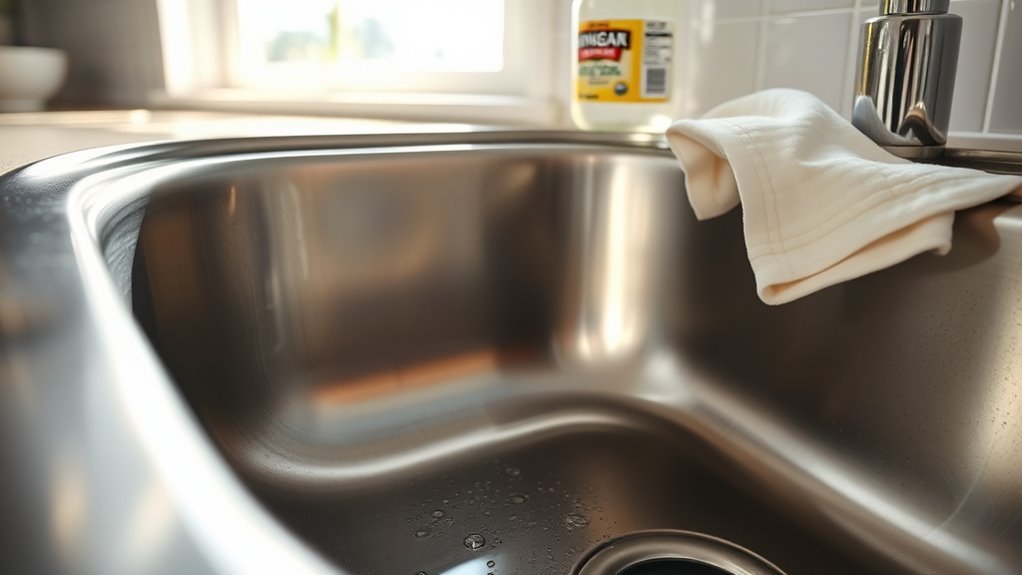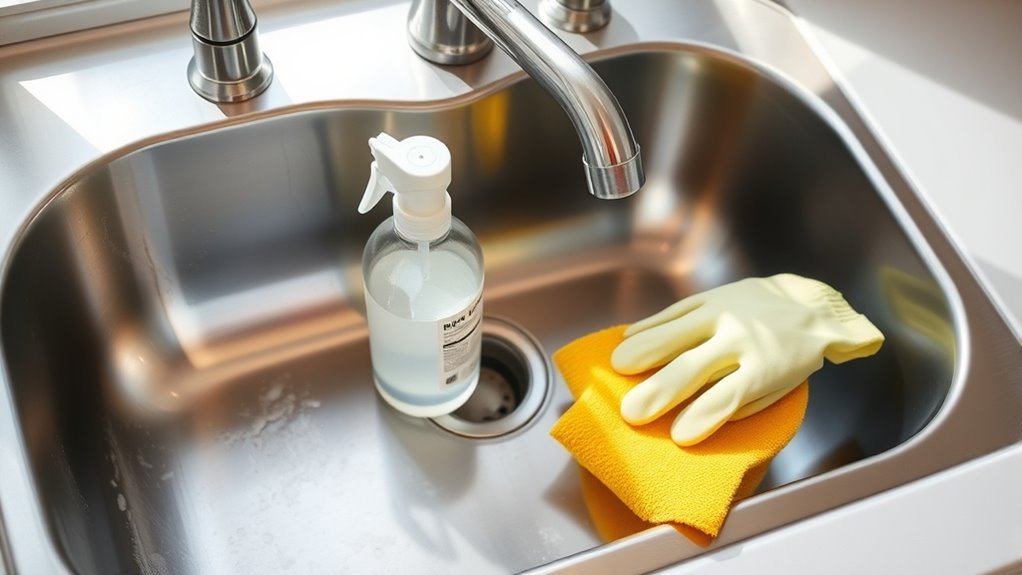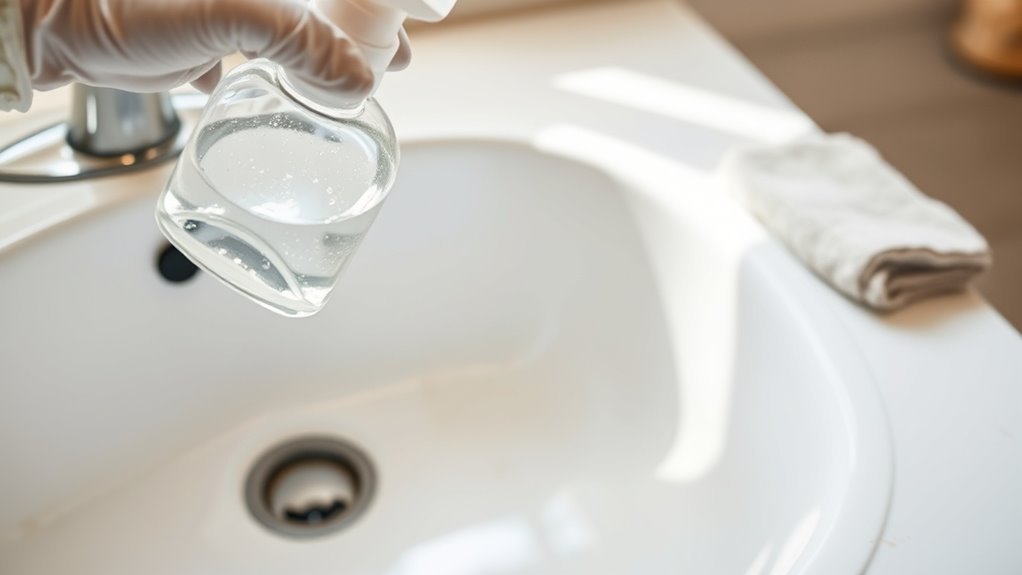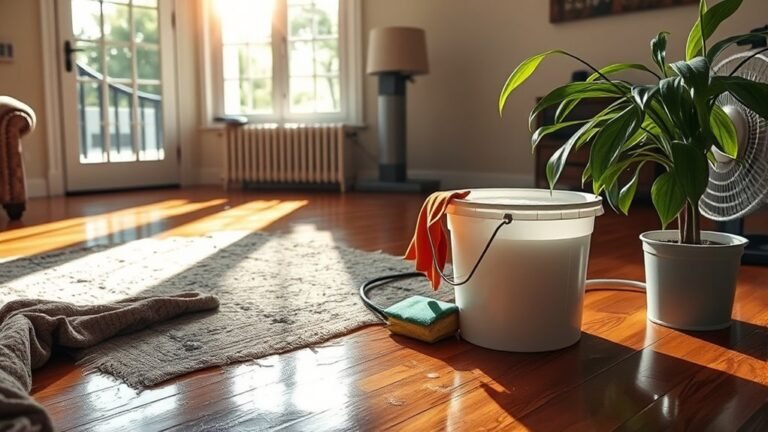How to Remove Hard Water Stains From Sinks
To remove hard water stains from your sink, first identify its material—stainless steel, porcelain, or granite—since each requires different care. Use white vinegar to dissolve mineral deposits by soaking a cloth and applying it to stains. For gentle scrubbing, a baking soda paste works well. Always wear gloves and avoid harsh abrasives to protect your sink. Regular wiping and occasional vinegar rinses can prevent buildup. Keep going, and you’ll discover even more effective, safe ways to keep your sink spotless.
Understanding the Causes of Hard Water Stains

Hard water stains form because your water contains high levels of minerals like calcium and magnesium. When this hard water evaporates on your sink’s surface, these minerals don’t just disappear—they stick around, causing that stubborn stain formation you want to eliminate. You might feel trapped by these marks, but understanding their cause is the first step toward freedom from them. These mineral deposits build up over time, creating a white, chalky film that’s tough to scrub away. Knowing this helps you realize it’s not dirt or grime, but mineral buildup from hard water. By grasping how hard water leads to stain formation, you’re already on the path to tackling these spots effectively, reclaiming your sink’s clean, smooth surface without hassle.
Identifying the Types of Sinks and Their Materials
Since different sink materials react differently to mineral deposits, it’s important to know what type of sink you have before treating hard water stains. Common sink materials include stainless steel, porcelain, granite composite, and cast iron. Each one shows and handles stain types uniquely. For example, stainless steel sinks might display chalky white marks from calcium buildup, while porcelain sinks often show dull, stubborn stains that require gentle care to avoid damage. Granite composite sinks resist stains better but still need proper cleaning to maintain their finish. Knowing your sink materials helps you choose the right approach, ensuring you don’t harm the surface while removing stains. Taking a moment to identify your sink’s material frees you to clean effectively and confidently, keeping your space looking fresh and unburdened.
Essential Tools and Supplies for Cleaning

To tackle hard water stains effectively, you’ll need the right cleaning agents tailored to your sink’s material. Don’t forget to wear protective gear like gloves to keep your hands safe during scrubbing. Having the proper tools, such as brushes or sponges, will make the job much easier and more efficient.
Cleaning Agents Selection
When you’re tackling tough mineral deposits, choosing the right cleaning agents can make all the difference. You want products that are effective yet safe for your sink and the environment. Doing some cleaning product comparisons helps you find options that balance power with eco friendliness, giving you freedom from harsh chemicals.
| Cleaning Agent | Best For |
|---|---|
| Vinegar | Eco friendly, mild stains |
| Commercial Cleaners | Tough stains, fast results |
| Baking Soda | Gentle scrubbing, safe |
Protective Gear Needed
You’ll almost always want to wear protective gear while removing hard water stains to keep your skin and eyes safe from harsh chemicals and abrasive scrubbing. Slipping on protective gloves shields your hands from irritants and harsh cleaners, letting you work confidently without worrying about damage or discomfort. Don’t skip eye protection either; splashes can happen unexpectedly, and goggles or safety glasses will guard your eyes from potential harm. Wearing this gear lets you tackle stubborn stains freely and safely, so you can focus on restoring your sink’s shine without risk. By prioritizing protective gloves and eye protection, you’re not just cleaning—you’re empowering yourself to handle the job with care and confidence, preserving your freedom to maintain your home safely.
Tools for Scrubbing
Once you’ve suited up with protective gloves and eye gear, gathering the right scrubbing tools is the next step. You’ll want a sturdy scrub brush with firm bristles to tackle those tough hard water stains without damaging your sink’s surface. Pair this with a non-abrasive sponge for delicate areas. Mastering proper scrubbing techniques is key—use circular motions with moderate pressure to break down mineral deposits without scratching. Avoid steel wool or harsh scrubbing pads that can leave permanent marks. Having a spray bottle filled with your cleaning solution on hand makes it easy to keep the area wet and loosen stains while you work. With these essential tools, you’ll reclaim your sink’s shine quickly and freely, without relying on expensive or complicated methods.
Using Vinegar to Dissolve Mineral Deposits

You can rely on vinegar’s natural acidity to break down tough mineral deposits left by hard water. Simply soak a cloth or sponge in vinegar and apply it directly to the stained area. Let it sit for a few minutes before scrubbing gently to lift the buildup.
Vinegar’s Acidic Properties
Although hard water stains can be stubborn, vinegar’s acidic properties make it an effective solution for dissolving the mineral deposits that cause them. You’ll appreciate vinegar benefits like its natural acidity, which breaks down calcium and magnesium buildup without harsh chemicals. This freedom from tough stains means less scrubbing and more time enjoying your clean sink. Acidic solutions like vinegar are safe, affordable, and eco-friendly, giving you a simple way to maintain your home.
| Property | Benefit | Effectiveness |
|---|---|---|
| Acetic Acid | Dissolves minerals | High |
| Non-toxic | Safe for surfaces | Gentle but strong |
| Affordable | Cost-effective | Readily available |
Use vinegar’s acid power to reclaim your sink’s shine effortlessly.
Application Techniques
Start by soaking a cloth or paper towel in vinegar and pressing it onto the stained area to let the acid work on breaking down mineral deposits. This simple application method targets stubborn hard water stains, loosening them without harsh chemicals. For tougher spots, you can spray vinegar directly, then cover the area with plastic wrap to keep the solution in place longer. After 15-30 minutes, scrub gently with a soft brush or sponge to lift the residue. Rinse thoroughly with water to reveal a clean, stain-free surface. These application methods put you in control, freeing you from costly cleaners while effectively restoring your sink’s shine. Embrace this easy, natural approach to stain removal and enjoy a sparkling sink without restrictions.
Baking Soda Paste for Gentle Scrubbing
A simple baking soda paste can work wonders on hard water stains without damaging your surfaces. By mixing baking soda with a little water, you create a gentle scrubbing agent that’s safe and effective. Here’s why you should give it a try:
Mix baking soda with water for a gentle, effective paste that tackles hard water stains safely and naturally.
- Baking soda is mildly abrasive, perfect for loosening stains without scratching.
- It neutralizes odors, leaving your sink fresh.
- The paste clings to vertical surfaces, letting you tackle spots easily.
- It’s affordable and eco-friendly, freeing you from harsh chemicals.
Apply the paste, let it sit for 10-15 minutes, then scrub gently with a soft cloth or sponge. You’ll enjoy a cleaner sink and the satisfaction of using a natural method that respects your space and your freedom to choose safe cleaning solutions.
Lemon Juice as a Natural Stain Remover
Two ingredients you likely have on hand can tackle hard water stains effectively—lemon juice being one of them. Lemon juice benefits go beyond flavor; its natural acidity cuts through mineral deposits, making it a powerful natural cleaning agent. Just squeeze fresh lemon juice onto the stains, let it sit for a few minutes, then scrub gently with a cloth or sponge. You’ll notice those stubborn spots start to fade without harsh chemicals. Using lemon juice means you’re embracing a simple, eco-friendly way to keep your sink spotless. Plus, its fresh scent leaves your space smelling clean and inviting. Choosing lemon juice lets you maintain freedom from toxins while handling tough stains effortlessly—proof that natural cleaning can be both effective and liberating.
Commercial Cleaners: When and How to Use Them
Sometimes natural remedies aren’t enough, and that’s when commercial cleaners come in handy. You’ll want to pick one that’s effective for your surface but also safe to use, so always check the label carefully. Plus, consider how the product impacts the environment before making your choice.
Choosing Effective Cleaners
Although natural remedies can be effective, commercial cleaners offer a faster and often more powerful solution for stubborn hard water stains. You might appreciate the freedom to choose between natural alternatives and strong chemical options based on the stain’s severity and your cleaning goals. When selecting a cleaner, consider these factors to maximize cleaner efficacy:
- Ingredients: Check for acidic components like vinegar or citric acid that break down mineral deposits.
- Surface compatibility: Verify the cleaner won’t damage your sink’s material.
- Ease of use: Look for sprays or gels that cling to stains for better results.
- Environmental impact: Pick products with biodegradable formulas if you want eco-friendly freedom.
Choosing the right cleaner empowers you to restore your sink efficiently without compromising your values.
Application Safety Tips
Because commercial cleaners contain strong chemicals, you’ll want to handle them with care to protect yourself and your surfaces. First, always read the label to understand proper application methods and recommended safety gear like gloves or goggles. Avoid mixing products, as this can create harmful fumes. Use a well-ventilated area to maintain fresh air while cleaning. Apply the cleaner directly to the stain or a cloth, not indiscriminately, to prevent damage to your sink’s finish. After treatment, rinse thoroughly to remove any residue. These cleaning precautions will help you maintain freedom in your space without risking harm. By following these steps, you’ll effectively remove hard water stains while keeping yourself safe and your sink looking great.
Environmental Considerations
Taking proper safety precautions is just one part of using commercial cleaners effectively. When tackling hard water stains, you want to balance power with responsibility. Commercial cleaners can be harsh, so consider eco friendly alternatives whenever possible to protect your space and the planet. Sustainable cleaning isn’t just a trend—it’s a way to keep your freedom from harmful chemicals while still getting the job done. Here’s what to keep in mind:
- Choose cleaners labeled as biodegradable or non-toxic
- Use commercial products sparingly, only for stubborn stains
- Dispose of cleaning residues responsibly to avoid pollution
- Ventilate your area well to minimize indoor toxins
Preventative Measures to Avoid Future Stains
To keep hard water stains from coming back, you’ll want to adopt a few simple habits that minimize mineral buildup. Using water softeners is a great way to reduce hardness in your water supply, freeing you from constant scrubbing. Also, regular maintenance of your sink and fixtures prevents residue accumulation, making stain removal easier.
| Preventative Action | Benefit | Frequency |
|---|---|---|
| Install Water Softeners | Reduces minerals in water | Once, with check-ups |
| Wipe Sink Dry | Stops water from sitting | After each use |
| Use Vinegar Rinse | Dissolves minor deposits | Weekly |
| Check Faucets | Prevents leaks and buildup | Monthly |
| Clean Aerators | Maintains water flow quality | Bi-monthly |
These steps help preserve your sink’s freedom from stains.
Tips for Maintaining a Spotless Sink Regularly
A few simple habits can keep your sink looking spotless day after day. By embracing consistent sink maintenance and regular cleaning, you free yourself from stubborn stains and the hassle of deep scrubbing later on. Here’s how to maintain that shine with ease:
Simple daily habits keep your sink spotless and save you from tough stains and scrubbing later.
- Wipe down the sink after each use to prevent water spots and residue buildup.
- Use a mild cleaner weekly to tackle any mineral deposits before they harden.
- Rinse thoroughly after every cleaning to avoid leftover cleaner marks.
- Keep a soft cloth or sponge handy for quick touch-ups anytime.
Adopting these quick steps guarantees your sink stays pristine without taking up much of your time. You’ll enjoy the freedom of a sparkling sink that’s always ready for whatever life throws your way.
Safety Precautions When Cleaning Hard Water Stains
Because hard water stains often require strong cleaners, you’ll want to handle them with care to protect yourself and your surfaces. Using proper cleaning techniques not only guarantees effective stain removal but also prevents damage and health risks. Always wear gloves and ventilate the area well. Avoid mixing chemicals, as that can create harmful fumes. Here’s a quick safety checklist to keep your freedom intact while tackling those stubborn stains:
| Precaution | Why It Matters | Tip for Stain Prevention |
|---|---|---|
| Wear gloves | Protects skin from irritants | Clean regularly to avoid buildup |
| Ventilate space | Avoids inhaling fumes | Use mild cleaners when possible |
| Avoid mixing products | Prevents toxic reactions | Rinse surfaces after cleaning |
| Test cleaners first | Prevents surface damage | Use soft cloths for delicate areas |
| Follow instructions | Guarantees safe, effective use | Maintain routine cleaning habits |
Frequently Asked Questions
Can Hard Water Stains Damage Plumbing Pipes?
Oh sure, hard water stains are just harmless little artists decorating your pipes, right? Well, not exactly. If you don’t keep up with plumbing maintenance, those mineral deposits can build up and cause pipe corrosion. Over time, this can lead to leaks and costly repairs, chaining you down to endless fixes. So, if you want to keep your freedom from unexpected plumbing disasters, it’s worth tackling those stains before they ruin your pipes.
How Does Water Softening Affect Sink Stains?
When you use water softening, you’re cutting down on minerals like calcium and magnesium that cause those stubborn sink stains. The water softening benefits include less buildup, making sink maintenance way easier and freeing you from constant scrubbing. You’ll enjoy cleaner surfaces and longer-lasting fixtures without feeling tied down by hard water troubles. It’s a simple way to reclaim your time and keep your sink looking fresh effortlessly.
Are There Eco-Friendly Alternatives to Commercial Cleaners?
You don’t need to buy a chemical army to fight stains! You can totally liberate your sink with an eco-friendly vinegar solution—just spray, wait, and wipe. For stubborn spots, sprinkle some baking soda, then scrub gently. These natural heroes break down hard water stains without trapping you in a cycle of toxic cleaners. You’ll feel free knowing you’re protecting both your home and the planet while keeping your sink sparkling!
What Causes Hard Water Stains to Reappear Quickly?
Hard water stains reappear quickly because your hard water sources contain high levels of minerals like calcium and magnesium. When water evaporates, these minerals get left behind, causing those stubborn stains. To prevent them, you’ll want to focus on stain prevention by regularly wiping surfaces dry and using water softeners or eco-friendly treatments. Taking control of your water quality gives you the freedom to enjoy cleaner sinks without constant scrubbing.
Can Hard Water Stains Affect Dishwasher Performance?
Imagine a sparkling dishwasher interior slowed down by stubborn white deposits. You might not realize it, but hard water stains can seriously impact your dishwasher’s performance. These mineral buildups interfere with dishwasher maintenance, clogging spray arms and filters. If you want your appliance to run freely and efficiently, tackling hard water impact is essential. Don’t let those invisible stains trap you in constant repairs or poor cleaning results.






